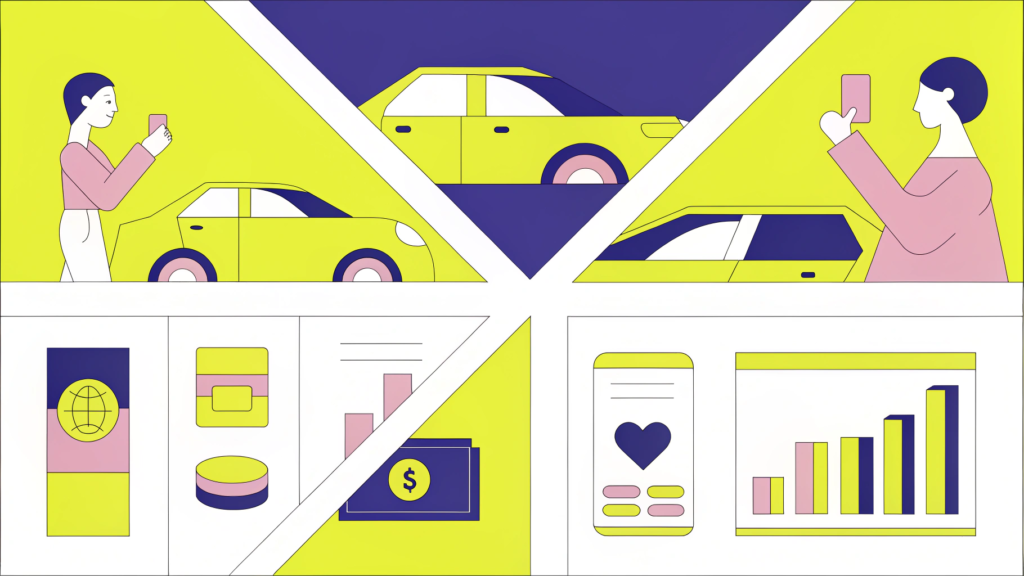Overview
This article delves into the critical aspect of maximizing influencer ROI within automotive marketing strategies, underlining the necessity of authentic collaborations with key figures in the industry. By illustrating how effective partnerships can lead to substantial enhancements in visibility, trust, and engagement, it becomes clear that these collaborations are pivotal. Ultimately, this approach not only fosters increased vehicle sales but also ensures a more significant return on investment for automotive brands.
Introduction
In the competitive landscape of the automotive industry, influencer marketing has emerged as a transformative strategy that leverages the credibility and reach of influential figures to connect with potential car buyers. This article delves into the intricacies of maximizing return on investment (ROI) through effective influencer partnerships. It highlights the profound impact these collaborations can have on brand visibility and consumer trust.
However, as automotive brands navigate this dynamic terrain, a pressing question arises: how can they ensure their influencer marketing efforts resonate with audiences and translate into tangible sales and long-term loyalty?
Define Influencer Marketing in the Automotive Industry
Influencer marketing in the vehicle industry is a powerful strategy that emphasizes collaborations with individuals who possess significant followings, ultimately enhancing influencer roi in automotive by targeting prospective car purchasers. These influencers encompass vehicle journalists, bloggers, and social media personalities renowned for their car reviews and lifestyle content. By leveraging their credibility and extensive reach, automotive companies can effectively promote their vehicles and services, which ultimately enhances influencer roi in automotive.
Working with influencers who resonate with target audiences not only boosts visibility but also . This strategy is particularly impactful in a landscape where consumers increasingly seek authentic recommendations, highlighting the importance of influencer roi in automotive before making significant purchases, such as vehicles. Notably, brands utilizing social media personalities can achieve influencer roi in automotive, resulting in engagement rates six times greater than conventional promotional techniques, underscoring the value of this approach in today’s competitive marketplace.
Successful partnerships, exemplified by Ford’s collaboration with lifestyle figures, demonstrate the potential to expand audience reach and foster emotional connections with consumers. This further confirms the effectiveness of such strategies in enhancing vehicle sales. Moreover, Fresh Content Society’s innovative tactics have yielded remarkable outcomes, including a staggering 6,000% increase in engagement and generating $50,000 in content monetization.
As Joe Gagliese, Chief Executive and Co-Founder at Viral Nation, asserts, businesses must pivot from traditional to social media-driven promotion to thrive, or risk losing market share. The evidence is clear: embracing influencer marketing is not just an option; it is a necessity for automotive brands aiming to succeed in a rapidly evolving market, as it significantly impacts influencer roi in automotive.

Measure ROI: Key Metrics and Evaluation Techniques
To effectively measure the ROI of influencer marketing in the automotive sector, brands must focus on several critical metrics:
- Engagement Rate: Analyzing likes, shares, comments, and overall interactions with influencer content is essential. A high engagement rate signifies that the audience is resonating with the message, which is crucial for campaign success.
- Reach and Impressions: Monitoring the number of unique viewers and the frequency of content display offers insights into the campaign’s visibility. In 2025, automotive promotion campaigns are projected to achieve significant reach, underscoring the importance of this metric for assessing overall impact.
- Conversion Rate: Tracking the percentage of viewers who take action—such as visiting a website or making a purchase—after engaging with promotional content is vital. This metric directly correlates with the campaign’s effectiveness in driving sales.
- Cost Per Acquisition (CPA): Calculated by dividing the total expense of the marketing campaign by the number of conversions, understanding CPA helps companies evaluate the cost-efficiency of their endorsement strategies, ensuring that promotional budgets are utilized effectively.
- Brand Sentiment: Employing social listening tools to assess audience sentiment before and after the campaign can yield valuable insights. Positive shifts in sentiment often indicate a successful alignment between the communicator’s message and the company’s values.
By consistently evaluating these metrics, vehicle brands can refine their strategies and optimize influencer ROI in automotive through their promotional efforts. Industry analysts emphasize that prioritizing tangible outcomes over vanity metrics is essential for achieving long-term success in this competitive landscape.
Implement Effective Influencer Marketing Strategies
To implement effective influencer marketing strategies in the automotive sector, consider the following steps:
- Identify the Right Influencers: Research and select influencers whose audience aligns with your target market. Focus on those with a genuine passion for automotive topics and a proven track record of engagement. Influencers who align with your values can significantly enhance authenticity and trust.
- Develop Clear Objectives: Define specific goals for your influencer campaign, whether it’s increasing awareness, generating leads, or driving sales. Establishing clear objectives will provide direction and help measure success.
- Create Authentic Collaborations: Collaborate with influencers to produce content that feels genuine and resonates with their audience. This could encompass vehicle evaluations, behind-the-scenes glimpses at car events, or lifestyle content that integrates your brand seamlessly. Authentic storytelling fosters emotional connections, enhancing audience engagement.
- Leverage Multiple Platforms: Utilize various social media platforms where your target audience is most active. Instagram, YouTube, and TikTok are particularly effective for car-related content, allowing for diverse engagement strategies and broader reach.
- Monitor and Adjust: Continuously track the performance of your promotional campaigns using key performance indicators (KPIs) such as engagement rates, click-through rates (CTR), and conversion metrics. Be prepared to adjust your strategy based on real-time data to optimize results.
By following these steps, automotive brands can create impactful influencer marketing campaigns that drive engagement and maximize ROI, ultimately fostering long-term relationships with their audience.
Conclusion
Influencer marketing has emerged as a crucial strategy for automotive brands seeking to enhance visibility and connect with potential buyers. By collaborating with influential figures in the automotive space, companies can leverage their credibility and reach to foster trust and engagement among consumers. This approach not only amplifies brand awareness but also significantly improves influencer ROI in automotive marketing, proving to be a vital component in today’s competitive landscape.
Key insights underscore the importance of:
- Selecting the right influencers
- Setting clear objectives
- Creating authentic content that resonates with target audiences
Metrics such as engagement rates, reach, conversion rates, and brand sentiment are essential for evaluating the effectiveness of campaigns and optimizing future strategies. Successful examples, such as Ford’s collaborations and Fresh Content Society’s innovative tactics, illustrate the tangible benefits of influencer partnerships in driving sales and engagement.
Ultimately, embracing influencer marketing is not merely an option for automotive brands; it is a necessity for thriving in a rapidly evolving market. By implementing best practices and focusing on measurable outcomes, companies can maximize their influencer ROI and build lasting relationships with consumers. The automotive industry stands at a pivotal moment where authentic connections and strategic marketing can redefine success—now is the time to act and harness the power of influencer marketing.
Frequently Asked Questions
What is influencer marketing in the automotive industry?
Influencer marketing in the automotive industry involves collaborating with individuals who have significant followings, such as vehicle journalists, bloggers, and social media personalities, to promote vehicles and services. This strategy aims to enhance return on investment (ROI) by targeting prospective car purchasers.
How does influencer marketing enhance ROI in the automotive sector?
By leveraging the credibility and extensive reach of influencers, automotive companies can effectively promote their products, which boosts visibility, cultivates trust, and drives engagement among potential buyers, leading to improved ROI.
Why is influencer marketing particularly effective in the automotive industry?
Consumers increasingly seek authentic recommendations before making significant purchases like vehicles. Influencer marketing resonates with target audiences, providing genuine endorsements that enhance trust and engagement, resulting in higher sales.
What are the engagement rates of influencer marketing compared to traditional promotional techniques?
Brands utilizing social media personalities can achieve engagement rates that are six times greater than those obtained through conventional promotional methods, highlighting the effectiveness of influencer marketing in the automotive industry.
Can you provide an example of a successful influencer marketing partnership in the automotive industry?
Ford’s collaboration with lifestyle influencers is an example of a successful partnership that expanded audience reach and fostered emotional connections with consumers, demonstrating the effectiveness of influencer marketing in boosting vehicle sales.
What remarkable outcomes have been achieved through innovative influencer marketing tactics?
Fresh Content Society’s innovative tactics have resulted in a 6,000% increase in engagement and generated $50,000 in content monetization, showcasing the potential impact of effective influencer marketing strategies.
What does Joe Gagliese, Chief Executive of Viral Nation, say about the necessity of influencer marketing?
Joe Gagliese emphasizes that businesses must shift from traditional promotion to social media-driven strategies to thrive in the automotive market, as failing to do so risks losing market share. Embracing influencer marketing is essential for automotive brands aiming for success in a rapidly changing environment.

